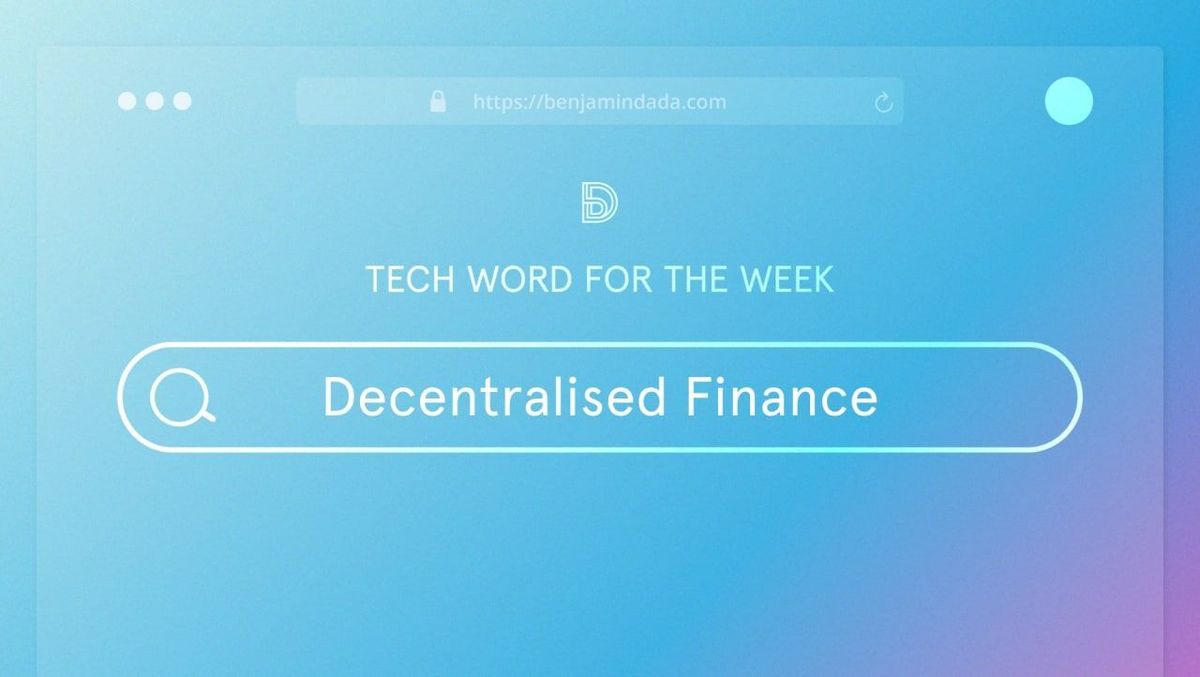Decentralised Finance
With Decentralised Finance you don’t need the permission of any central authority on how much you spend. No financial or central authority can stop, delay or block your transactions and assets.

Tech Word For The Week is a weekly series where we look to explain commonly used words in the tech ecosystem in a simple, engaging way.
Have you ever sent money to someone in another country and it got delayed for days? Or you’ve had to pay some extra amount because you want to do business?
Worse still, have you ever wondered what would happen to your money if your bank shut down today?
These examples and more are the loopholes of the current traditional financial system running in most nations of the world. The system is called Centralised Finance.
The traditional system acts as the governing body to regulate and control all transactions. However, the system has struggled to adapt to changing human needs and move with the times. The broken system also faces issues such as lack of trust, inability to fully embrace digital technology, strict regulations, etc.
The introduction of WEB 3.0 and its underlying technologies has the potential to disrupt the entire financial landscape. One of these technologies is Decentralised Finance.
Definition of Decentralised Finance (DeFi)
Decentralised Finance is the collective term used to describe financial products and services built on blockchain. Like the traditional financial system you can transfer, borrow, invest, speculate, trade, insure or lend money. But that’s where the similarity ends.
Related article: How DeFi can facilitate better access to financial services in Africa
In fact, the goal of DeFi is to eliminate the centralised financial system which acts as the middleman and regulatory authority. DeFi will allow people, merchants and businesses conduct transactions through peer to peer networks and smart contracts (run on blockchain).
Peer to peer network refers to transactions between two people with no intermediary. The networks use security protocols, connectivity, software, and hardware advancements.
Smart contract is where the rules are made, but not by a third party. Rather, they are logic programs on blockchain that execute the transaction once the predetermined conditions are met.
Let’s make it simpler. For instance, you saw a product you love on an international ecommerce store and wanted to order it. Instead of making a transfer from your bank to the supplier’s bank account (which might take days if not weeks), you open your DeFi application (dApp) and search for the details of the supplier.
The algorithm routes you directly to your supplier (anywhere he is around the globe) and the payment is made once you meet the terms. No third party. No delay. Simply easy-peasy.
Pros of Decentralised Finance
- Ownership You become the real owner of your money. You don’t need the permission of any central authority on what you spend and how much you spend. No financial or central authority can stop, delay or block your transactions and assets.
- Fast: DeFi is a cheap and swift financial system. Transactions made to anyone, anywhere, around the globe run with the speed of light. Also, the costs of transaction is reduced to the barest minimum.
- Superior technology: The traditional banking system runs on programs such as COBOL, which dates back to the 1960’s. Meanwhile DeFi is a WEB 3.0 technology which will keep evolving as more people embrace it.
- Transparent: No third party can influence or tamper with transactions. The cryptographic principles for blockchain ensures verification of authenticity before any transaction is approved. Also, you don’t need to apply for anything or “open” an account. You just get access by creating a digital wallet.
Cons of Decentralised Finance
- Uncertainty: DeFi is hosted on a block chain project like (ethereum) and in the event of instability, the block chain could automatically inherit instability from the host.
- Shared Responsibility: The DeFi projects do not take responsibility for your mistakes. All it does is take away the intermediaries, and it is the users who have to take responsibility for their funds and assets. Therefore, DeFi space needs tools that could prevent possibilities of human mistakes and errors.
- Concern of Liquidity: Liquidity is a critical factor in DeFi based projects and blockchain protocols. According to Nasdaq, as of November 2020, the total value locked in DeFi projects amounts to more than $13.6 billion. Clearly, the DeFi market is not as big as the traditional financial systems. So, it can be difficult to put your trust in a sector that does not have much as the usual financial sector.
Key Takeaways
- DeFi will allow people, merchants and businesses conduct transactions through peer to peer networks and smart contracts (run on blockchain).
- DeFi is a cheap and swift financial system.
- It's a decentralised alternative to the existing financial system






